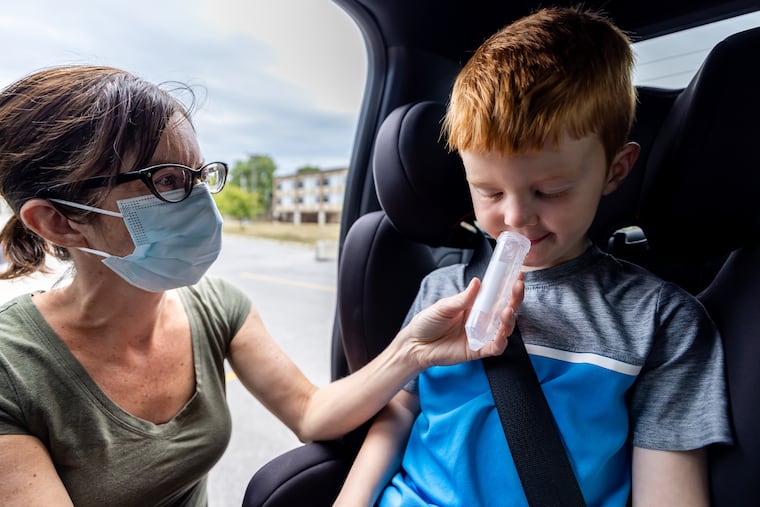Saliva test may predict COVID-19 severity among children, Penn State research finds
A rapid, noninvasive saliva test may be able to detect which children are at greatest risk for developing severe COVID-19 symptoms, according to ongoing research out of Penn State.

A simple saliva test may be able to determine which children are at greater risk of developing severe COVID-19 symptoms, according to early research findings by doctors at Pennsylvania State University.
While the vast majority of children who contract the virus experience only mild symptoms or none at all, early identification of those who are at risk of developing severe cases would help doctors better monitor and intervene before children become critically ill, said Steven Hicks, a pediatrician at Penn State Health Children’s Hospital and coauthor of the study.
“It’s sometimes difficult to predict for parents when what looks like normal upper respiratory symptoms could progress to something worse,” Hicks said. “If we can know at the time of diagnosis whether a child is going to have severe or mild symptoms, that can drastically change the way we manage a case of COVID.”
Children at greater risk of severe illness could be admitted to the hospital for observation and quick intervention if symptoms worsen, and avoid the most serious complications, such as respiratory failure.
» READ MORE: Millions have lost a loved one to COVID-19. Grief’s mental and physical burden is especially heavy on kids.
With cases of COVID-19 among children rising, there is an “urgent need” to understand which children are at greatest risk of severe illness, Hicks said.
Children account for about 16% of all COVID-19 cases and a fraction of a percent of deaths attributed to the virus. But since the highly contagious delta variant’s rise over the summer, the number of children under age 4 hospitalized with COVID-19 is up tenfold, according to the CDC.
In Pennsylvania, the number of children with COVID-19 was 10 times higher the first week of September, compared with the same period last year. Between Sept. 2 and Sept. 8, as schools reopened for in-person classes, nearly 5,400 Pennsylvania children between ages 5 and 18 had confirmed infections, compared with 574 children with COVID-19 the same week in 2020, when students were remote, according to the Pennsylvania Department of Health.
“This noninvasive and painless method for determining COVID-19 severity could have the potential to help clinicians begin timely and appropriate treatment, which may improve patient outcomes,” Hicks said.
The four-year study, launched in January, explores the relationship between cytokines, a type of protein developed in response to infection, and COVID-19, using saliva samples collected from children under age 18 admitted to the emergency departments at Children’s Hospital of Michigan and UPMC Children’s Hospital of Pittsburgh.
In their initial analysis of saliva samples from 150 children, researchers found elevated levels of two cytokines among those who later developed severe COVID-19, compared with those with more mild symptoms.
Researchers hope to enroll a total of 400 children by the end of the year and begin a larger-scale analysis in 2022.
If larger samples reinforce their early findings, researchers could seek approval from the Food and Drug Administration for the saliva test to be used routinely as part of COVID-19 diagnosis in children.
The study has focused on children because the researchers specialize in pediatrics and because funding came from organizations dedicated to child health, but the concept may also be used to help identify which adults are at greatest risk for severe COVID-19, Hicks said.
The study is funded by the Eunice Kennedy Shriver National Institute of Child Health and Human Development through the National Institutes of Health’s Rapid Acceleration of Diagnostics.